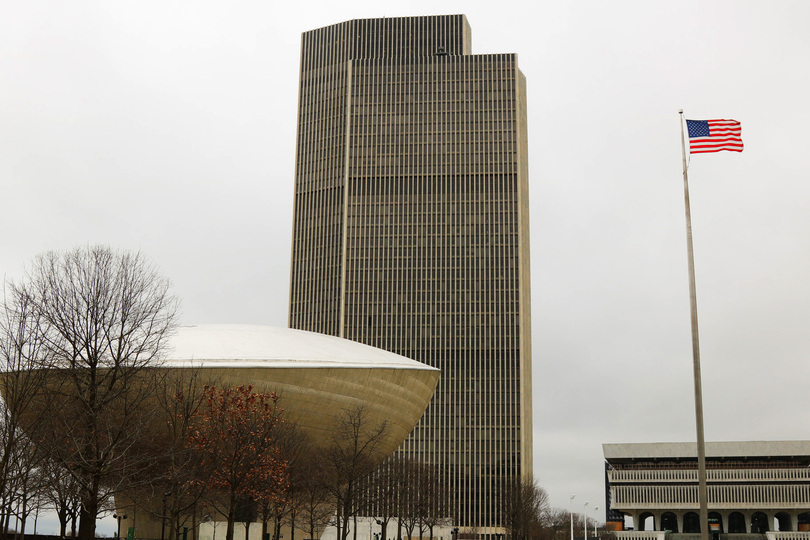New state legislation targets college life improvements, affordability

Originally proposed in Gov. Kathy Hochul’s State of the State Address, laws include college affordability, increased job opportunities and expanding mental health resources. Avery Magee | Asst. Photo Editor
Get the latest Syracuse news delivered right to your inbox.
Subscribe to our newsletter here.
During the summer session, New York state lawmakers passed several key pieces of legislation aimed at improving the lives of college students statewide.
Focusing on affordability, increasing job opportunities and expanding mental health resources, many of the initiatives were originally proposed during Gov. Kathy Hochul’s State of the State Address in January. A number of these proposals were passed throughout the summer and will be implemented throughout the 2025-26 academic year.
One of Hochul’s most notable programs, which provides adults in the state without a college degree a free community college education, will expand access to community college through SUNY and CUNY Reconnect.
Students pursuing “high-demand” degrees, including artificial intelligence, engineering, cybersecurity, nursing and manufacturing, are eligible for the program, which passed July 1.
Under this $47 million initiative, with $28.2 million and $18.8 million allocated to SUNY and CUNY, respectively, students will receive tuition, books and additional fees covered after their federal financial aid is applied.
With Micron Technology set to construct its semiconductor manufacturing plant in Clay, the program will help New York state residents graduate debt-free and find employment in these growing industries throughout central New York.
“The cost of pursuing a degree should never be a barrier for New Yorkers,” Hochul said in a July 1 release. “That’s why we’re opening the doors of opportunity at SUNY and CUNY so that students can achieve their dreams.”
In May, Hochul also signed additional legislation through the Fiscal Year 2026 Enacted Budget, allocating $307 million to SUNY and CUNY campuses to support their general operating costs and student services. The investment includes tuition grants, textbooks, transportation costs and academic advising.
The budget also includes $15 million specifically for artificial intelligence research and workforce development, aligning with the state’s list of “high-demand” occupations.
SUNY and CUNY research facilities will receive $443 million to assist student and faculty researchers. An additional $979 million will be allocated to state-operated campuses and senior colleges to be used for “other project” funding.
In addition to education and infrastructure policies, Hochul announced that the Empire State Development Board approved $40 million to launch Empire AI Beta. This is the second phase of the “supercomputer” assisting the current Empire AI initiative.
The original Empire AI project is a “state-of-the-art computing facility” housed at the University of Buffalo, created to pioneer AI research throughout New York state. The Beta version is “11 times more powerful” than the original Empire AI system, providing advancements in AI research for the “public good.”
The FY26 Budget also included a $450 million investment in SUNY Upstate Medical Hospital for its “modernization and revitalization.” On Aug 10, Upstate announced plans to demolish four of its buildings for a brand-new emergency care unit.
Upstate, the only Level 1 trauma center in the area, will move forward with its renovation plans, which include burn units, surgical suites, operating rooms and an imaging suite with medical and diagnostic imaging.
The hospital is currently in the second stage of the approval process, with construction planned to take place over the next few years.
SUNY Chancellor John B. King Jr. and the SUNY Board of Trustees said Gov. Hochul’s FY26 Budget and the finalized legislation show her continued dedication to improving New York state, in a May 9 release.
King said the research funding for local infrastructure, including both Upstate and Downstate Medical Hospitals and capital funding of SUNY and CUNY, is sending “exactly the right message about the value of research to improve our lives and communities.”
“This year’s budget represents another vote of confidence in public higher education and a brighter, more prosperous, and more sustainable future for New York State,” King said in the release.





